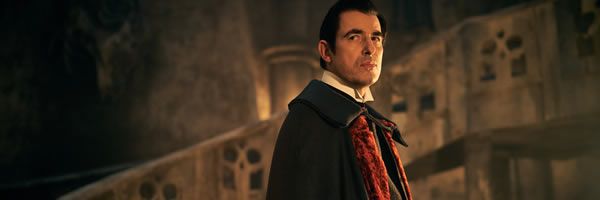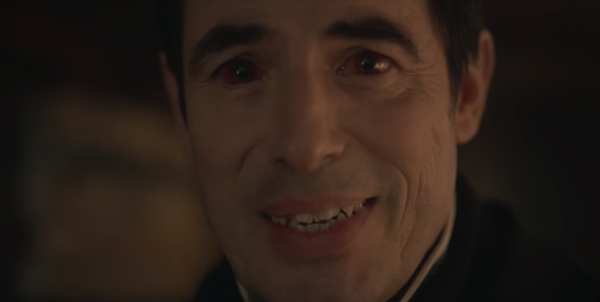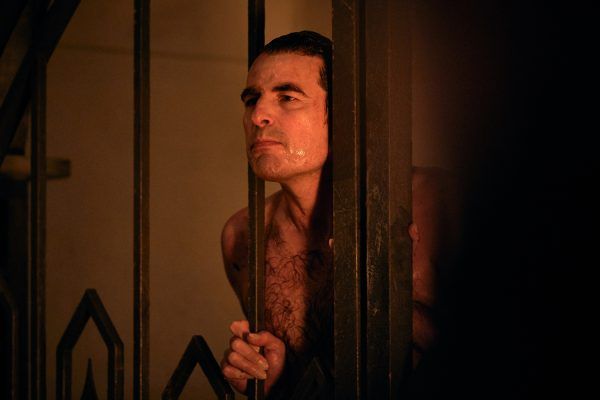Co-creators and showrunners Steven Moffat and Mark Gatiss’ (Sherlock) reimagining of Bram Stoker’s classic novel Dracula is arguably the most liberal (and bloody) adaptation of the material ever. The show’s “kitchen sink” approach deconstructs and reframes key events and plot points from the book and puts them through a very modern and, sometimes, convoluted lens.
Here, Count Dracula (Claes Bang) literally crosses “oceans of time” (as Gary Oldman’s Dracula said in Coppola’s 1992 film) on his way to England to feast on modern day society and confront the toll that being an immortal takes on the legendary vampire.
It’s the conclusion of that journey, across the series’ three feature-length episodes, that has left some bingewatchers scratching their heads. To sort out the series’ final moments (which upend all you know about Dracula), it’s necessary to focus on Dracula’s core themes and how they build to one last tragic feast for the Count.
What That Ending Means
After a 123-year sleep at the bottom of the ocean following the fateful voyage of the Demeter, Dracula rises from his coffin and steps onto the shores of modern England. There, he confronts Agatha Van Helsing (the exceptional Dolly Wells), who now occupies (because reasons) the body of her cancer-stricken relative Zoe (also Wells), who presides over the Jonathan Harker Foundation—a covert mercenary group armed and ready for Dracula’s return. Zoe ultimately defeats Dracula in a weird murder-suicide pact—a far cry from what fans of the book are used to when it comes to slaying the iconic suckhead.
So, wait: How does Agatha—a 19th Century nun-slash-wannabe-vampire-slayer—manifest herself in her ancestor’s body? In the third and final episode, “The Dark Compass,” Zoe drinks a vial of Dracula’s blood. In doing so, since Dracula had previously fed on Agatha, Zoe ingests enough of Agatha’s essence to allow her dead relative to take over her body in one last attempt to stop her nemesis. (Everybody got that? Cool? Cool.)
In their final moments, Zoe calls Dracula out on all his shit.
His allergy to the cross, mirrors, and sunlight? They are all in his head, Zoe argues. They are no more than affectations; ticks that the Count acquired throughout his career as an immortal predator. He’s had them for so long, he has forgotten why he even disliked them at all. Worse, he uses them as a crutch to evade what truly compromises him.
Zoe believes that it is easier for Dracula to avoid the sun and mirrors due to his shame for being what and who he is. For preying on souls in a manor beneath his well-groomed and “high class” facade. He feels unworthy, less than, hence why he can’t enter a room without first being invited in.
As for crosses, that hate comes from an envy and shame of sorts regarding Christ. Zoe argues that Christ, a selfless figure, is everything the selfish Dracula is not. A person who willingly died for our sins versus a being who drains others of their life for the sole purpose of sustaining his own.
"It speaks of the courage you long to possess," Zoe/Agatha tells a troubled Count. "The courage it takes to die. I call you ashamed."
By calling out Dracula’s shame, Zoe gives him a chance to redeem it. We know that, due to Zoe’s cancer, her blood is toxic to the vampire. So drinking from her will kill him. In what ultimately ends up being a mercy kill, Dracula sucks on Zoe’s blood and, in doing so, frees them both from their mortal existence and ends their suffering. (The count, after death, remarks that dying wouldn’t hurt.)
The show establishes early on that vampires can’t kill themselves with wooden stakes, so “death by drinking cancer blood” is the fastest and best way for Dracula to end his life on his own terms. A life filled with shame and regret for failing to find a way to live it the way his dignified brothers and father lived theirs. Scared of facing a life spent taking everything from anyone he wanted, robbing families of loved ones for his own vanity, Dracula tricked himself into thinking he had various “kryptonites” out there. Why? Because that was easier than facing and reconciling with the truth.
Dracula kills himself because Zoe forces him to realize that nothing and no one else will. There’s no game to be won. No blaze of glory. Just release. An end.
And while some criticize Dracula’s choice to show Zoe mercy, by taking her life instead of letting her cancer do it, it is consistent with the show’s themes this iteration of the character finds himself servicing. In the second episode, “Blood Vessel,” we learn aboard the Demeter that Dracula can absorb the traits, language, and knowledge of everyone he feeds on. Since he drinks from Agatha, a nun, the mercy and compassion running in her veins now courses through his.
It has just been in stasis since the 19th Century, waiting for its host to find a soul worth saving other than his own.




